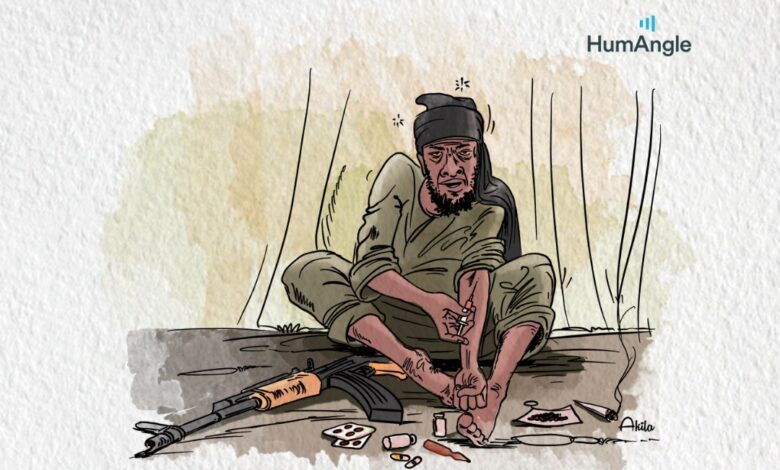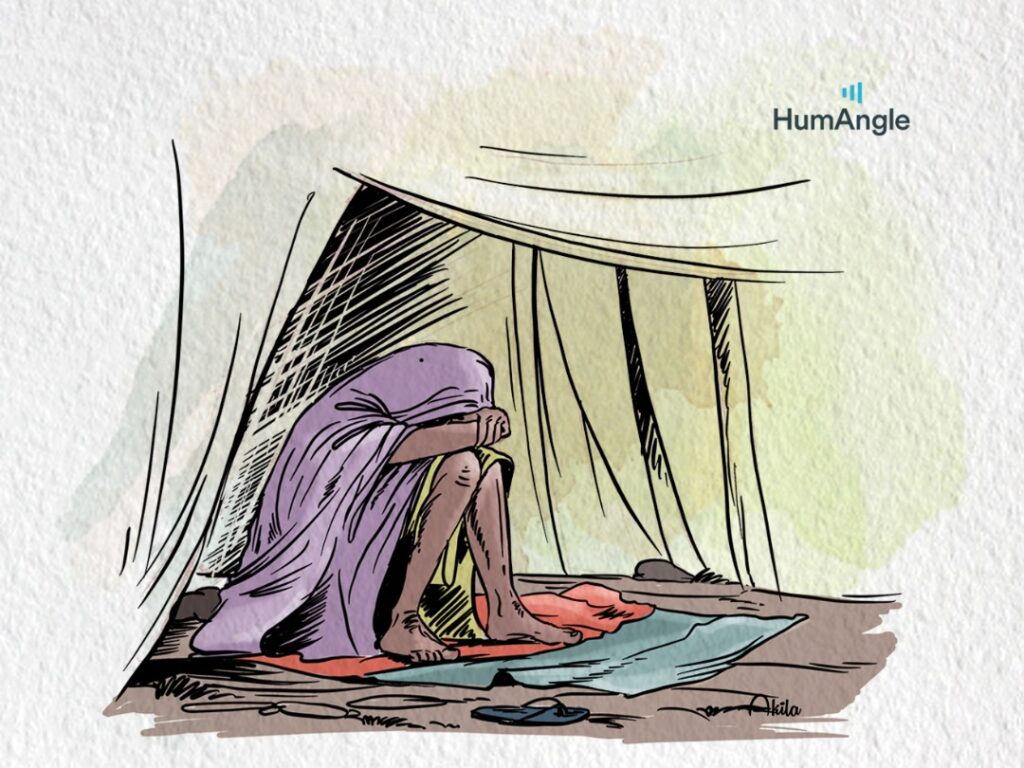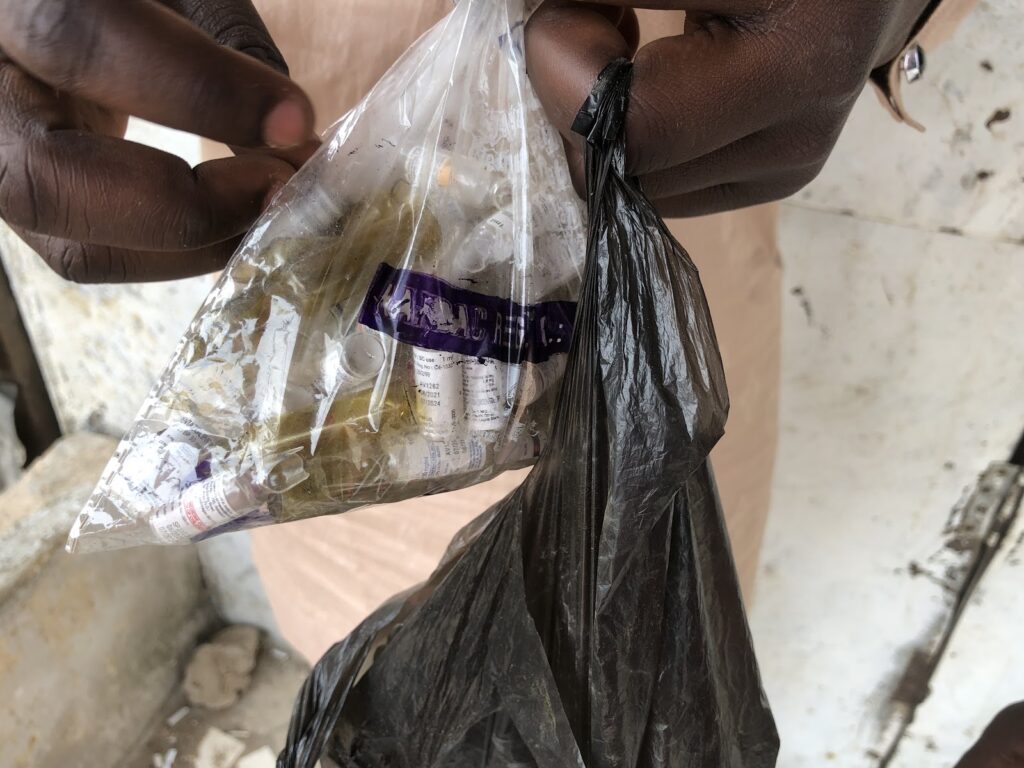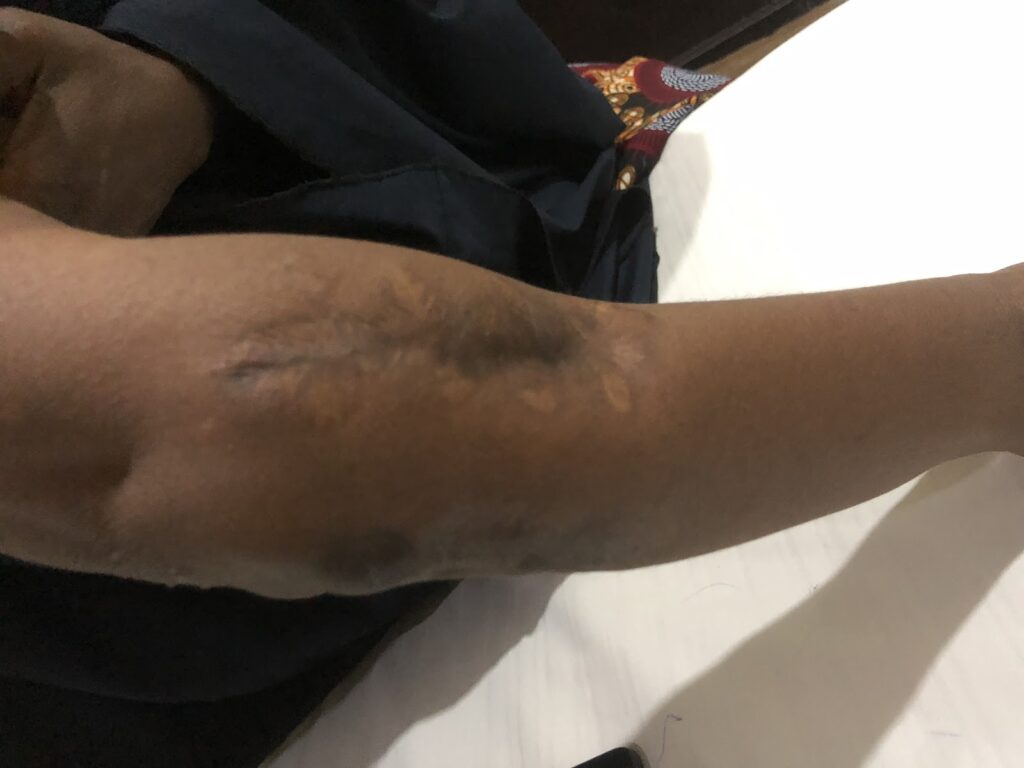The Drug And Sex Lives Of Boko Haram Terrorists
Women abducted during the early years of the Shekau-led Boko Haram insurgency in Borno, northeastern Nigeria, ended up becoming wives of the insurgents. HumAngle spoke to those who recently escaped about an aspect of their abduction that has been under-documented — the sex life of the insurgents.

One hot night in the deep forests of Sambisa, in northeastern Nigeria, shortly after a military airstrike targeted the settlement of the Abubakar Shekau-led Boko Haram where they lived, Amina Mohammed and her husband — alongside many members of the terror group who had fled the location during the bombing — are hurdled up in hiding.
They are under small, inconspicuous tarpaulin tents. It is very uncomfortable because they are trying not to attract attention to themselves, as an aircraft can still be heard hovering above their heads. This means staying still is the surest means of surviving. Still, in the middle of the palpable tension and ensuing danger, she sees her husband approaching her corner of the tent with a familiar expression. She knows what is to come and braces herself for it.
There is no talk; he simply comes to her. The sex is aggressive. So aggressive that it numbs out her inner thighs, and she feels as though there is an organ from deep inside her that may spill out of her vagina. It is not an irrational fear or concern.
She has a friend who experienced a curious incident she believes was prompted by her husband’s use of excessive and prolonged force during sex, which she says was so aggressive that her uterus fell out of her vagina. This friend was married to a Boko Haram member as well.
When Amina’s husband first enters her tent as she sits on a tarpaulin, she notices that he smells of drugs and so knows this is one of those nights he can go several rounds without tiring. The first round lasts two hours, then he rests and goes another round.
He is her third Boko Haram husband, the other two having died — the first, by execution, and the second at the war front. So, by now, she knows the drill. It does not make it any less bearable.
“They make love like horses,” she says, referring to their energy.
“They only care about their satisfaction […] Even when you complain of tiredness, they won’t let you be, as long as you are not on your period, they don’t care. They have sex anywhere, even when we are under attack. Sometimes, even under the tree.”
Even now that she has returned to town, she hears comments about her marriageability.
“People see me and whisper among each other that no man can sexually please any woman who has been married to a Boko Haram member before.”
Uterine prolapse
Uterine prolapse is a condition in which the uterus in a woman’s body falls out of place and protrudes out of her vagina. It usually needs to be pushed back into place. The prolapse occurs when the ligaments and muscles supporting the uterus get weakened and can no longer support it in place.
According to Dr Ishaku Musa, a chief consultant obstetrician and gynaecologist at the Gwarinpa General Hospital in Abuja, “forceful intercourse can damage the support structures of the womb. This now leads to uterine descent, also called uterine prolapse.”
This was what happened to Amina’s friend.

Uterine prolapse is widespread among the women captives, especially due to limited access to medical supplies. Often, it happens during childbirth. Many of the women are girls who were abducted seven to 10 years ago and who have had to grow among the terror group and be married off to its members. Some of them are now radicals as well.
Stephen Yusuf, a doctor at the Abubakar Tafawa Balewa University Teaching Hospital (ATBUTH), explains that the uterus is kept in position by various ligaments. “Repeated pregnancy and delivery weakens these ligaments,” he says. “Or if there is a very large baby. And some other conditions that weigh down on the uterus from above.”
Amina says there wasn’t enough support for child birthing in the terrorist camps. Even though there were sometimes medical personnel, usually those abducted in Maiduguri and Adamawa, they were not enough for all the people needing help.
“All the children I gave birth to there, I did it alone. No doctor, no help […] A lot of women die when giving birth. There is no proper care. When I had my last child, it was my friend that served as a midwife. We used a stick to cut the umbilical cord after the baby was born.”
Drug use among the terrorists
On the day Amina asked her husband for ₦500 to buy tomatoes for food, he not only denied having the amount, he nearly became violent towards her. It would not have been the first time.
But later that same day, he pulled a wad of naira notes from his pockets and gave them to her. It totalled ₦30,000 when she counted it. She became terrified.
“How can someone that refused me ₦500 give me ₦30,000?” she remembers thinking. “I became scared.”
Still, she took it. After handing her the money, he hung his rifle around his neck, then walked out without first wearing his shoes.
When he returned later at night, still barefoot, he informed her his money was missing. ₦30,000 to be exact. She reminded him that he had given her the money. He labelled her a liar and accused her of stealing it from his pockets.
Amina admits that before he gave her the money, she had seen him injecting himself with drugs, as he occasionally did. He was more of the pills-popping type, but sometimes he injected himself too. The effect usually lasted hours.
“I told him he was not in his right senses; that I saw him take the injection, and what was it meant for?”
He told her to keep quiet, asking if she was looking to get him killed. The punishment for drug use amongst Boko Haram members is death. It did not stop the terrorists, including Amina’s husband, from using it in hiding.
Usually, after he had injected himself, he would give her the bottles to bury in the ground, she says. But after she confronted him that day about his drug use, he became suspicious and scared that she might one day out him. So he ordered her to dig up all the bottles from wherever she had buried them, and then give them to him to dispose of himself.

“I went and dug everything out with my bare hands and gave them to him, and he threw them away,” she recalls.
The pills were easier to take for him because then he could just claim they were pain killers. Once, she asked to take the pills to numb the pain she was feeling, and he warned her not to, saying that she would run mad if she did.
“They always say they are pain killers. One time I attempted to take the drug — it is red in colour — and my husband said I will run mad if I take it. How will I run mad when he has not? And they usually take it when they are about to go to the battlefield. They go out of their senses after taking these drugs.”
She did not know it then and would not until she left Sambisa forest but the pills her husband took were mostly tramadol, and the injections, pentazocine.
But Boko Haram members do not use drugs only before going to the battlefields. They also used them in preparation for sex. It made them so energetic and powered up that they could spend an entire night on rounds and rounds of sex tirelessly, Amina says. It was also often aggressive. Another woman, Maijiddah, tells HumAngle that barely three months into her marriage with one of the men in Sambisa, she sought to end the marriage for this reason.
But she could not ask for divorce explicitly. She, therefore, threatened to report his drug use to the terror group’s leadership because it was what powered his violent sexual activities.
Before this, she had first tried to run away from the group. She was caught and locked up in prison for some time.
“He was so into drugs that without it, he would be useless. He was also a dealer. He could spend an entire night on top of me. Sometimes he would sleep off on top of me, and if I tried to roll him off, he would immediately get violent.”
Like Amina’s husband, he also partook in the use of tramadol and pentazocine. When she threatened to report him, he opted to divorce her instead. “He said since I wanted to destroy his life, he would rather divorce me, and he did. That was how I escaped that life.”
After the divorce, she was transferred to a building known as Gidan Zaurawa, she says. A Hausa term translates to ‘House of the Single Women.’ It was where women among the terror group who were either divorced or widowed were kept for three to four months before being remarried.

How does Pentazocine work?
Pentazocine is an opioid in the same class as tramadol. According to Dr Yusuf, there are other opioids that can be injected for the purpose of ‘getting high’, like morphine and fentanyl but they are very expensive. Their effect is also short-lived. Pentazocine, known among drug users as ‘Penta’ for short, is cheaper than the rest, in addition to having a more lasting effect.
“It’s usually to numb pain but it also causes euphoria and makes them happy. That’s the major feeling. The feeling of euphoria,” Dr Yusuf says.
“That euphoric feeling might be the reason he took that amount of money and gave it to his wife even though he would not have given it to her normally if he wasn’t under drug influence.”
Any religious justification?
Drugs — intoxicants, generally — are prohibited in Islam. And, since the terror group insists it is Muslim, the use of drugs is generally prohibited among Boko Haram members.
However, the group has seen different stages of evolution and acceptance of the vice. According to sources familiar with its operations, at some point it started to unofficially overlook the use of hard drugs, especially tramadol, on the basis of it being helpful to them on the war front and therefore necessary for their work. When certain members were questioned about its use, they argued that it usually helped them with strength on the battlefield.
While the use of tramadol, therefore, has always been rampant among the group, it is usually mostly hidden. It is ferried through to the militants from Damboa, according to Maijiddah, usually the same way that bullets are sent down to them through canoes. She also explained that individuals partner with allies who are domiciled inside the towns.
A report published in 2018 described the pill as “the drug of choice for Boko Haram.”
Certain hard drugs have been used, too, by the group to aid amputation due to their limited access to medical supplies. Later, as the group evolved, they began to use the drugs for sex too.
According to women who had been wives of eminent members of the insurgent group, hardcore members of the group are not punished for the use of hard drugs. Sometimes, even high-ranking members were punished, as long as they were identifiable as people with milder or less radical ideologies.
“It’s usually the members that are not hardcore radicals that are punished for it,” one of the women says. “The ones that don’t know what they’re doing, that are only there to fight aimlessly.”
Support Our Journalism
There are millions of ordinary people affected by conflict in Africa whose stories are missing in the mainstream media. HumAngle is determined to tell those challenging and under-reported stories, hoping that the people impacted by these conflicts will find the safety and security they deserve.
To ensure that we continue to provide public service coverage, we have a small favour to ask you. We want you to be part of our journalistic endeavour by contributing a token to us.
Your donation will further promote a robust, free, and independent media.
Donate HereStay Closer To The Stories That Matter




